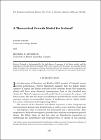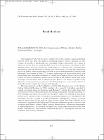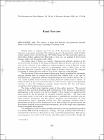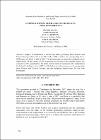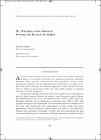Browsing by Author "Barry, Frank"
Now showing items 1-20 of 24
- Sort by:
- title
- issue date
- submit date
- Order:
- ascending
- descending
- Results:
- 5
- 10
- 20
- 40
- 60
- 80
- 100
-
A theoretical growth model for Ireland
Barry, Frank; Devereux, Michael B. (Economic & Social Studies, Dublin, 2006)Ireland is distinguished by the high degree of openness of its labour market and the importance of foreign direct investment (FDI) in the economy. We develop a neo-classical growth model to explore the consequence of these ... -
Aggregate job creation, job destruction and job turnover in the Irish manufacturing sector
Strobl, Eric A.; Walsh, Patrick Paul; Barry, Frank (Economic & Social Studies, Dublin, 1998)Using an annual employment survey data set we construct aggregate job flow rates for the Irish manufacturing sector for the period 1974 to 1994. We report the existence of simultaneous job creation and job destruction, ... -
Barry Project: Firm-Level Data on Irish Industrial History
Barry, Frank (Trinity College Dublin, 2023)The book 'Industry and Policy in Independent Ireland, 1922-1972' identifies the leading indigenous and foreign-owned manufacturing firms engaged in production in Ireland at any stage over the period from the establishment ... -
Book review: Interrogating Irish policies / by William Kingston. Dublin: Dublin University Press, 2007.
Barry, Frank; Kingston, William (Economic & Social Studies, Dublin, 2008) -
Book review: The politics of high-tech growth: developmental network states in the global economy / by Sean O Riain. Cambridge University Press. 2004.
Barry, Frank; O Riain, Sean (Economic & Social Studies, Dublin, 2005)?Sticky places in slippery space? is one of the best-known phrases from the literature on economic geography. The ?slippery space? is the globalised world of highly mobile capital, labour and technology. The ?sticky places? ... -
Business Establishment Opposition to Southern Ireland's Exit from the United Kingdom
Barry, Frank (2022)After more than a century of political and economic integration, Southern Ireland exited the United Kingdom in 1922. By identifying the leading business firms of the era and the political and religious allegiances of their ... -
Comment on "Dangers for Ireland of an EMU without the UK: some calibration results" by Frank Barry
FitzGerald, John D.; Barry, Frank (Economic & Social Studies, Dublin, 1998)In the October 1997 issue of this journal Barry set out a simple model of the Irish economy. The model was designed to quantify the possible effects on Ireland of sterling weakness, where Ireland is a member of the EMU and ... -
Competitiveness implications for Ireland of EU enlargement
Barry, Frank; Hannon, Aoife; Hudson, Elaine; KEARNEY, COLM (Statistical and Social Inquiry Society of Ireland, 2003)Subject to ratification, a further ten states, primarily from Central and Eastern Europe will accede to the EU in May 2004. Another two, and possibly three, CEE states are likely to join in 2007. The present paper assesses ... -
Crowding out effects of government spending
Barry, Frank; Devereux, Michael B. (Economic & Social Studies, Dublin, 1992)This paper surveys the recent theoretical literature on the linkage between government spending and the real economy. Two broad frameworks are explored. Nee-Keynesian models deal with economies characterised by wage or ... -
"Crowding out effects of government spending": a comment
Fagan, Gabriel; Barry, Frank; Devereux, Michael B. (Economic & Social Studies, Dublin, 1992)This paper presents a review of the current state of macroeconomic theory concerning the impact of Government spending on economic activity. The models presented reflect the current approach in theoretical analysis of ... -
"Dangers for Ireland of an EMU without the UK": a reply to John FitzGerald
Barry, Frank; FitzGerald, John D. (Economic & Social Studies, Dublin, 1998)In his comment on my 1997 paper John FitzGerald (JFG) makes the following points: (i) While the ESRI study on EMU, henceforth ESRI (1996), found no evidence of my hypothesis of downward nominal wage rigidity, this could ... -
Dangers for Ireland of an EMU without the UK: some calibration results
Barry, Frank (Economic & Social Studies, Dublin, 1997)This paper presents a small-open-economy model calibrated to Irish data. The model can be used for many purposes. It is applied here to the EMU debate. It comes close to replicating the employment effects of sterling ... -
The Irish Single-Currency Debate of the 1990s in Retrospect
Barry, Frank (SSISI, 2017)Ireland was one of the initial EU member states to move to currency union as of January 1st 1999. The single-currency project, and Ireland’s participation in it, had been vigorously debated within the Irish economics ... -
Making sense of the data on Ireland?s inward FDI
Barry, Frank; O'Mahony, Clare (Statistical and Social Inquiry Society of Ireland, 2005)Ireland, in employment terms, is the most FDI-intensive economy in the EU. International comparisons of trends and levels of FDI intensity are usually based on balance-of-payments data however, and the international data ... -
Mr. Whitaker and industry: setting the record straight
Barry, Frank; Daly, Mary E. (Economic & Social Studies, Dublin, 2011)After 16 years of unbroken Fianna Fail rule, the first four of the five general elections of the period 1948-1963 saw sitting governments unseated. Economic policy pivoted: protectionism was abandoned; foreign direct ... -
Multinationals and indigenous employment: an "Irish disease"?
Barry, Frank; Hannan, Aoife (Economic & Social Studies, Dublin, 1995)In trade studies, Ireland emerges as having a revealed comparative disadvantage in labour-intensive industries. Can the country's unusual industrial structure contribute to our understanding of its high unemployment? The ... -
On the causes of Ireland's unemployment
Barry, Frank; Bradley, John (Economic & Social Studies, Dublin, 1991)This paper attempts to account for the rise in Irish unemployment between 1970 and 1987. To this end a fully articulated medium-term model of the economy is employed, in contrast to the four equation model of the labour ... -
Payroll taxes, capital grants and Irish unemployment: a comment
Ruane, Frances; Barry, Frank (Economic & Social Studies, Dublin, 1989)In this paper Frank Barry examines the issue of the appropriateness of capital versus labour subsidies in the Irish economy, in the context of three different models, namely a neo-classical small-open-economy model, a ... -
Payroll taxes: capital grants and Irish unemployment
Barry, Frank (Economic & Social Studies, Dublin, 1989)A recent OECD study concluded that no other member country had a tax/subsidy system as biased against the use of labour as the Irish. This view of the flawed nature of the Irish system has, however, been disputed by many ... -
Policy Coherence for Development (PCD): The State of Play in Ireland
KING, MICHAEL; Barry, Frank; Matthews, Alan (Institute for International Integration Studies, 2009)This report is the first systematic assessment of policy coherence for development (PCD) across Irish Government departments. Our objectives were as follows: ? To create an inventory of policy areas where Irish government ...




